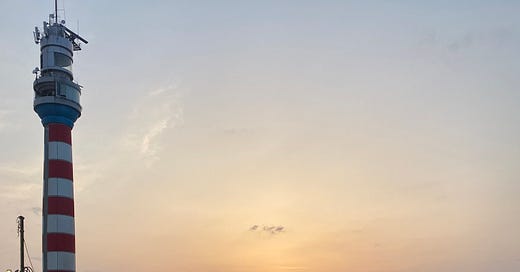First, if you’re new here, thank you so much for subscribing. My name is Anna, and I wrote a book called Love Across Borders, which is a little book of real life love stories that have been shaped by borders and immigration. Of course, these were always relevant, but unfortunately feel all that much more relevant when we are living in a world where “mass deportations” are a campaign promise, and immigrants are scapegoated for the price of eggs.
I’d love to get to know you, too—so if you are new here, drop me a note and tell me about yourself! Where are you tuning in from and what made you subscribe? What would you like to learn about—I’ll try to keep that in mind, while I’m writing to you.
Some of you know that I’m working on another book—a piece of fiction—which explores the world of Arab journalists working in newsrooms in the West, trying to function while their hearts are breaking over the genocide in Gaza. It examines the complicated webs of various diasporas, the connections we have to our homelands, and the mindfuck of being pressured and silenced both at work and in our lives.
It has been meta, to say the least. Creating robust, three-dimensional characters who carry the stories of Palestine, Syria and Lebanon with them has involved just as much research or even more research than the non-fiction and journalism that I produce, so this is why I picked up a copy of Beirut Fragments, by Jean Said Makdisi—right before Israel started pummeling Beirut.
I watched in horror as places that I knew were suddenly destroyed. Places where I fell in love and had screaming fights. Places where I laughed and danced and cried and fell in love all over again. The weird part is, many of these places play an enormous role in the book I’m writing, meaning that I’m constantly evoking memories of them. What if I never got to see them again? I wondered if this was what it was like to only have memories—which is the case for so many of our elders and ancestors.
I wondered about the end-game. Some piece of shit published an article titled “Southern Lebanon is actually Northern Israel”—it was about the historic presence of Jews in the area, but coupled with Hebrew-language mock ups for condos in Southern Lebanon, it came off as colonizer modus operandi. It wouldn’t be the first time. I wondered if I would ever be able to go back.
At one point, it felt like my fingers stopped typing. What else was there left to say? Some people create art in these times. Others fall silent. I’ve managed to do both. Some days, the only way that I can process the world around me is to write fragments and half sentences that most people will never see, other days I try to post on social media. Instagram reels. Reach people where they are, its your duty as a journalist! Write a good hook to get their attention. What if I told you that Israel is a genocidal maniac? Here are three ways that your country is using your tax dollars to bomb your people.
How long before none of this is shocking anymore?
Another war metastasized through our smart phone screens. Instagram filters make airstrikes look like epic plumes of pink smoke. A stage production. Text written over it. A message. In real life, it’s terrifying chaos. How quickly can walls crumble? A ceasefire. What kind of optimism does it take to have faith that it won’t happen all over again? I’m in awe of the people who have this, after everything.
Now, I’m struck by the videos of people going home. Dancing in the street out of celebration, not in defiance of Israeli airstrikes. We deserve more than performing resilience for social media algorithms. We all deserve joy.
I’m also struck by the way that this war has allowed the Syrian rebels to take back Aleppo, to free people who have been detained by Assad for dozens of years. Will people be able to go back to Syria soon? No one knows what tomorrow will bring, but this is what it looks like to still have faith in a revolution. This is what it looks like to not give up hope.
I’m also thinking of all of the people who deserve to go home. A ceasefire in Lebanon is unfortunately not a ceasefire in Gaza and as new wars have flared up around the region, Israel has continued to pummel Gaza. Even though there has been unprecedented solidarity around the world for Palestine and Palestinians, it hasn’t done anything to stop weapons shipments to Israel, to stop the world from turning away.
What can we do differently? What would be more effective? These are the questions I’m left with at this moment in time. What are yours?





